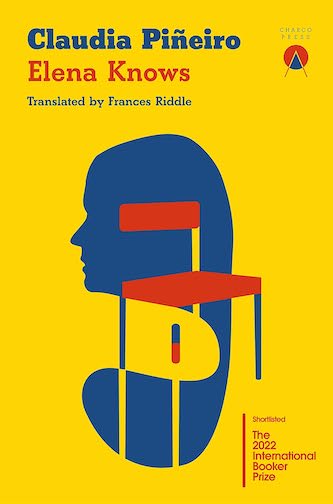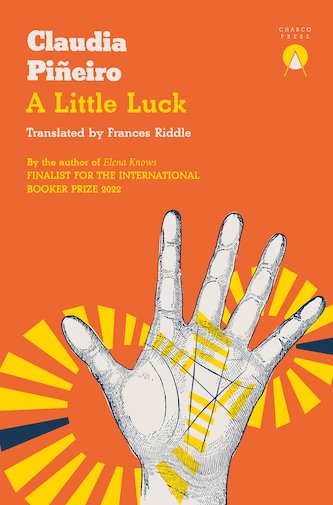Book Reviews: The Novels of Argentine Author Claudia Piñeiro — More Than Mysteries
By Brooks Geiken
A death is routinely at the center of Claudia Piñeiro’s fiction, but the corpse sparks provocative questions about the way things are, not just an investigation into finding the murderer.
Elena Knows, 173 pages, and A Little Luck, 208 pages, by Claudia Piñeiro. Translated by Frances Riddle. Charco Press.
 Argentine author Claudia Piñeiro consistently turns out bestsellers in the Spanish-speaking world that make international waves. In fact, she is the third most translated author from that country, behind Jorge Luis Borges and Julio Cortázar. So it is understandable that the Scottish publishing house Charco Press would jump at an opportunity to release English versions of Elena Knows (2021) and A Little Luck (2023). And Frances Riddle has provided a pair of sparkling English translations. Elena Knows was shortlisted for the International Booker Prize in 2022 and won the Premio Pepe Carvalho Prize for crime fiction in 2019. Four of Piñeiro’s novels have been adapted and made into films. Elena Knows was adapted into a Netflix film in 2023. Piñeiro’s 8 episode series The Kingdom (2021) currently showing on Netflix, has sparked controversy because of its portrayal of the Evangelical church in Argentina
Argentine author Claudia Piñeiro consistently turns out bestsellers in the Spanish-speaking world that make international waves. In fact, she is the third most translated author from that country, behind Jorge Luis Borges and Julio Cortázar. So it is understandable that the Scottish publishing house Charco Press would jump at an opportunity to release English versions of Elena Knows (2021) and A Little Luck (2023). And Frances Riddle has provided a pair of sparkling English translations. Elena Knows was shortlisted for the International Booker Prize in 2022 and won the Premio Pepe Carvalho Prize for crime fiction in 2019. Four of Piñeiro’s novels have been adapted and made into films. Elena Knows was adapted into a Netflix film in 2023. Piñeiro’s 8 episode series The Kingdom (2021) currently showing on Netflix, has sparked controversy because of its portrayal of the Evangelical church in Argentina
Ostensibly, Piñeiro writes crime novels, or what critics usually refer to as mysteries. But she also routinely goes about subverting genre expectations, often seamlessly infusing into her plots social, political, or moral dilemmas. So yes, there is routinely a death at the center of her fiction, but the corpse sparks provocative questions about the way things are, not just an investigation into finding the murderer.
Elena Knows (originally published in Spanish in 2007) begins with a journey that Elena, mother of the deceased Rita, takes to find someone to help her find her daughter’s killer.
Elena is a stubborn person who sincerely believes that she knows everything about her daughter and the circumstances surrounding her death. She is convinced that — if she can venture across Buenos Aires to the house of a specific acquaintance — the woman is in the position to help her find the assassin. What makes this journey particularly difficult: Elena is plagued by a rare form of Parkinson’s and needs medication to assist her walking. Once that pill kicks in, she can walk more easily. Still, it takes Elena a long time to get anywhere.
Piñeiro flashes back in time, bringing revelatory clarity to the complex relationship between mother and daughter. We see that their relationship had been acrimonious, filled with constant bickering and significant disagreements. They have diametrically opposed views of life: Mamá Elena wants her daughter to marry and have children; hija Rita has no intention of getting married nor having children. Elena Knows is told from the point of view of Elena, so we see this discord — and everything else — through her eyes. Is she a reliable narrator? Readers have to decide whether or not to believe her.
Elena takes on the role of the detective because the police can’t find any evidence of wrongdoing. Elena knows her daughter well enough to know that Rita could not have committed suicide. Narrative tension is created by alternating between the protagonist’s drive to bring the murderer to justice and the physical and mental debilitation brought on by her Parkinson’s disease. For example, Elena can only vaguely remember how to find the one person who could assist her in her quest. Even though Elena is not that old (she is in her 60s), the challenges of her aging body, compounded by Parkinson’s, shapes the narrative’s drama.
Piñeiro is well-known in Argentina for her activism on behalf of women’s rights, and in this novel she addresses two intertwined social issues: abortion and the role of the Catholic church. The conflict over abortion is hinted at in the story’s beginning, when Elena and Rita prevent a woman from entering an abortion clinic. The Catholic Church believes that abortion is a sin and that it should be forbidden. Argentina, a Catholic country, made abortion legal in 2021 — for the first time since 1886. During the course of the novel, the issue comes under intense scrutiny when seen through the eyes of the tough-minded Elena and, by extension, her devout daughter, Rita.
 In A Little Luck (originally published in Spanish in 2015), protagonist Mary Lohan returns to her native Argentina after twenty years in Boston. In order to go back, Mary deems it necessary that she alter her appearance completely, even changing the color of her eyes. Ever so slowly, the narrative makes it clear why Mary left Argentina and why, at this point in time, she needs to return.
In A Little Luck (originally published in Spanish in 2015), protagonist Mary Lohan returns to her native Argentina after twenty years in Boston. In order to go back, Mary deems it necessary that she alter her appearance completely, even changing the color of her eyes. Ever so slowly, the narrative makes it clear why Mary left Argentina and why, at this point in time, she needs to return.
Suffice it to say that a car accident disrupted Mary’s world so radically that she had to leave everything behind, including her six year old son, Federico. Piñeiro adroitly describes the central accident, at first only doling out minor details. The writer fills in more backstory as the novel progresses, squeezing out just enough tantalizing tidbits to build up the suspense. The final solution to the puzzle isn’t surprising, but the outcome remains devastating.
When Mary left Argentina she had been disoriented by the trauma of the auto calamity. Fortunately, Robert, a passenger on Mary’s flight out, came to her rescue. He became an indispensable part of her life in America; she was eventually employed by a prep school accreditation firm Robert founded. But when Robert develops cancer, his dying wish is for Mary to return to Argentina and confront the ghosts of her past. She reluctantly agrees to his desire and the tortuous journey commences.
Mary realizes that going back to Argentina may well bring her into contact with the very people who drove her to leave her homeland in the first place. What’s more, she will inevitably encounter her son, Federico. Mary’s son has become a history teacher at a school she will be called on to visit; she must interview him as a part of the accreditation process. In A Little Luck, Piñeiro poses two melodramatic questions. Will Mary’s son see through her meticulous disguise? And if he does, what will his reaction be to the mother who abandoned him so many years before? Piñeiro has written for the cinema, and she undercuts the inevitable tearjerker possibilities by spotlighting suggestion rather than whipping up emotion. And there is a powerful political angle here that elevates the confrontation beyond the personal.
In Elena Knows, Piñeiro grapples with thorny real world issues, such as the legality/morality of abortion as well as what it means to be a Catholic in Argentine society today. She also explores a fraught relationship between mother and daughter. A Little Luck takes a different internecine tack, but it also draws on broader social issues as it probes the pain of those who are victimized by injustice: it examines the plight of those who, for no fault of their own, are abandoned by the community and shunned by society.
Brooks Geiken is a retired Spanish teacher with a lifelong interest in music, specifically Afro-Cuban, Brazilian, and Black American music. His wife thinks he should write a book titled “The White Dude’s Guide to Afro-Cuban and Jazz Music.” Brooks lives in the San Francisco Bay Area.

